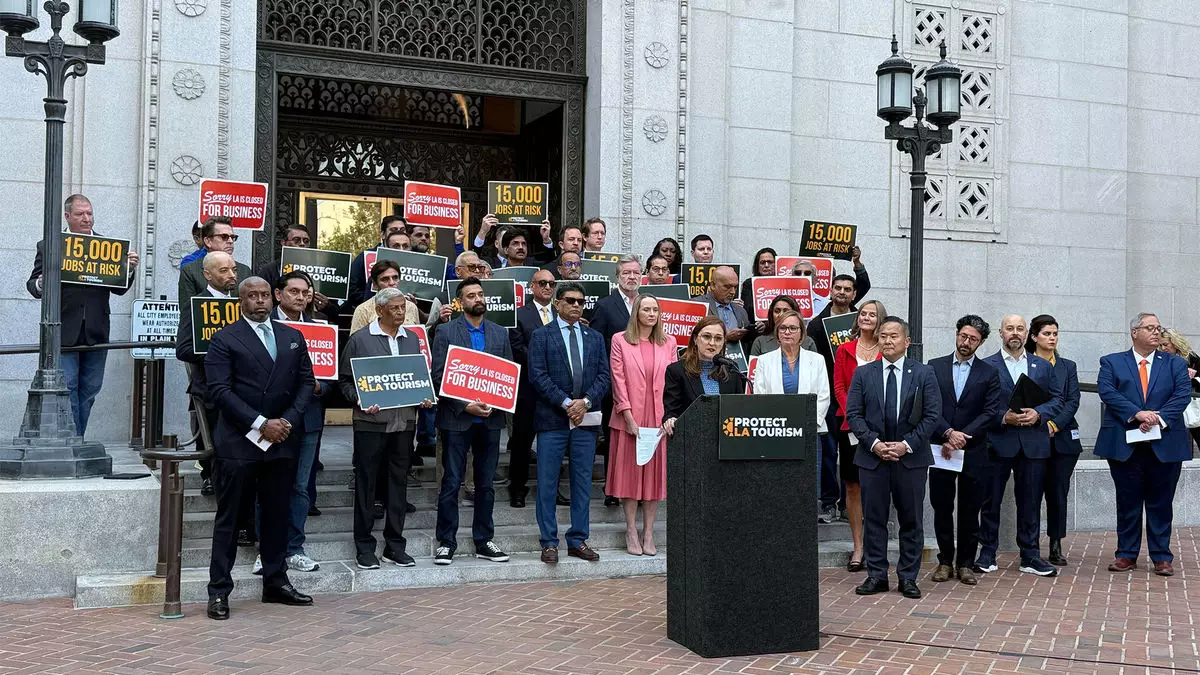In Los Angeles, a proposal to raise the minimum wage for tourism workers to $30 per hour has become a lightning rod for passionate opinions and vigorous debate. This contentious initiative, referred to as the “Olympic Wage Ordinance,” aims to increase wages for workers in hotels with over 60 rooms and airport employees by 2028, coinciding with the anticipated influx of visitors for the Los Angeles Olympics. However, while supporters argue it’s a necessary step toward equity, opponents warn that the repercussions could destabilize an industry struggling to recover from the compounded challenges of the COVID-19 pandemic and destructive wildfires.
Gathering at Los Angeles City Hall, stakeholders voiced their concerns, fearing that the proposed wage hike could escalate operating costs for hotels and local businesses by upwards of 69% in a mere two months. Councilmember Traci Park characterized the potential impact as unprecedented, indicating a profound shift that could reshape the tourism landscape in Los Angeles. With the city still grappling with recovery, many are asking whether this sweeping change is feasible or if it could trigger job losses and diminished support for local businesses.
The Economics Behind the Ordinance: A Complex Landscape
The American Hotel & Lodging Association (AHLA) recently released a report highlighting findings from Oxford Economics, suggesting that if the ordinance is enacted, it could lead to the elimination of approximately 14,000 hotel jobs and a staggering $169 million decline in state and local tax revenues. Such numbers, coming at a time when the hotel sector is vulnerable, prompt serious consideration of the long-term viability of the proposal.
Opposition comes not only from individual hoteliers but also from industry coalitions, including the Los Angeles Area Chamber of Commerce, which has established the Alliance for Economic Fairness to rally against the ordinance. The developers behind significant projects, such as the Hilton Los Angeles/Universal City, are reconsidering their investments due to apprehensions over the new wage framework. Maria Salinas, the Chamber’s CEO, articulates a central concern: while advocating for a living wage is important, the timing may not be right given the current state of the tourism sector.
The State of L.A. Tourism: Not a Simple Recovery
Los Angeles is trailing behind other major U.S. cities in the recovery of its tourism industry. While the average revenue per available room (RevPAR) for the city hit 104% of its 2019 levels as of March, other markets have soared beyond that threshold, many recovering to between 110% and as high as 145%. This disparity reflects a concerning trend—while revenue figures may seem optimistic when viewed in isolation, broader indicators reveal that the city’s room demand is still at 95% of pre-pandemic levels.
The challenges the city faces are compounded by the January wildfires, which inflicted considerable damage and disrupted local tourism in significant ways. Business leaders like Tom Kiely, CEO of Visit West Hollywood, emphasize the adverse effects of these disasters, asserting that the fires set back recovery efforts at a crucial time.
A Historical Perspective: Workers Versus Corporations
Labor organizations rally behind the wage increase, advocating for the rights of tourism workers who have struggled to keep pace with skyrocketing living costs in Los Angeles. Unite Here Local 11, which represents over 32,000 hospitality workers in Southern California and Arizona, argues for a substantial wage increase, framing it as essential for families to maintain housing stability in a notoriously expensive market. Kurt Petersen, the union’s co-president, highlights the economic benefits of investing in workers rather than funneling profits into corporate coffers.
Moreover, proponents of the ordinance argue that with major events like the World Cup, the Super Bowl, and the Olympics poised to elevate tourism activity, it’s the perfect opportunity to ensure the city’s economic benefits translate into tangible improvements for its working-class residents. The sentiment is that labor should reap the rewards of such a vibrant tourism sector.
The Future in Focus: Optimism Amidsteadfast Challenges
Despite the challenges, some industry stakeholders express cautious optimism regarding a tourism rebound in Los Angeles. As various high-profile events draw near, there are early signs of increased activity in the hospitality sector. Reports suggest a general uptick in bookings, promising a potentially bright future for the city’s economy. However, barriers to entry remain, including a recent downturn in international tourism and competition from more attractive destinations.
Michael Stathokostopoulos of CoStar Group reminds us that Brisbane’s hotel market heavily depends on inbound leisure travel, especially from international visitors. Problems at LAX Airport, which have seen passenger traffic dip significantly, pose a further hurdle for recovery aspirations.
Ultimately, as the discussions about the minimum wage proceed, they encompass far more than mere dollars and cents—they are indicative of a larger struggle between corporate interests and the rights of workers. The choices made today will resonate long after the applause of the Olympics fades, making it imperative for decision-makers to ground their choices in a vision for an equitable and thriving industry.


Leave a Reply